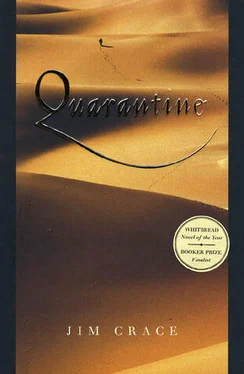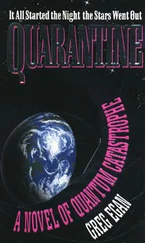Jim Crace - Quarantine
Здесь есть возможность читать онлайн «Jim Crace - Quarantine» весь текст электронной книги совершенно бесплатно (целиком полную версию без сокращений). В некоторых случаях можно слушать аудио, скачать через торрент в формате fb2 и присутствует краткое содержание. Год выпуска: 1998, Издательство: Straus and Giroux, Жанр: Современная проза, на английском языке. Описание произведения, (предисловие) а так же отзывы посетителей доступны на портале библиотеки ЛибКат.
- Название:Quarantine
- Автор:
- Издательство:Straus and Giroux
- Жанр:
- Год:1998
- ISBN:нет данных
- Рейтинг книги:4 / 5. Голосов: 1
-
Избранное:Добавить в избранное
- Отзывы:
-
Ваша оценка:
- 80
- 1
- 2
- 3
- 4
- 5
Quarantine: краткое содержание, описание и аннотация
Предлагаем к чтению аннотацию, описание, краткое содержание или предисловие (зависит от того, что написал сам автор книги «Quarantine»). Если вы не нашли необходимую информацию о книге — напишите в комментариях, мы постараемся отыскать её.
Quarantine
Quarantine — читать онлайн бесплатно полную книгу (весь текст) целиком
Ниже представлен текст книги, разбитый по страницам. Система сохранения места последней прочитанной страницы, позволяет с удобством читать онлайн бесплатно книгу «Quarantine», без необходимости каждый раз заново искать на чём Вы остановились. Поставьте закладку, и сможете в любой момент перейти на страницу, на которой закончили чтение.
Интервал:
Закладка:
‘They might be bees from anywhere. .’
‘What anywhere?’ asked Musa. He turned to Marta, cocked his head, narrowed his eyes. What kind of woman argued with a man? This kind; square-faced and large; broad-backed. ‘Beyond my land there is my cousin’s land. And then my uncles’ land is after that, and then my land begins again. That’s further than a bee can fly. That’s further than any one of you can run before you’re caught. Let’s not fall out.’ He spoke the last line with his sweetest voice. He turned to Aphas again. He had to hide his smiles. ‘Where did your neighbour find the nest? Near here?’
‘We didn’t see. We saw, but. .’
‘What did you see?’ He had the afternoon to waste. He’d bully them.
‘We saw him, weli, he got a length of stick. .’
‘You say he went to fish for bees?’
‘. . and he took a bit ofbone he found and hollowed out the stick. .’
Musa allowed the man to chatter, only interrupting now and then, a herdboy idly tweaking an old goat’s rope. This billy posed no threat to him. Musa could afford to let him talk. The talking was an opportunity for Musa to perfect his plans, to come up with some way of sending these men on errands in the night while he could stay behind to occupy their caves. So it was only with half an ear that Musa listened to Aphas while he described with the wonder of a townsman how the badu had plugged one end of the hoHowed stick with a piece of rotting apricot. .
‘What apricot? Where have you stolen apricots?’
‘We bought the fruit from you.’
‘Well, then. They were good apricots, and cheap. Too good to put in sticks. Go on, then. Speak. I didn’t say that you should stop.’
The badu, Aphas continued, had pushed the plugged end of his hollowed stick into the ground outside his cave and then backed into the shadows, on his haunches, to wait for bees. It wasn’t long before a bee had landed on the stem, and crawled into the hollowed stick in search of fruit. It flew away. It came back with companions from its nest, and soon there were a hundred bees transporting dabs of apricot.
‘The badu put his thumb down on the open end. Like that,’ said Aphas. He slapped his own thumb on a rock, though not as dramatically as he had hoped. ‘He’d trapped ten bees inside the stick. What did he do?’
‘He got ten stings?’
‘. . he let one out to fly away. He followed it, down there. Until he couldn’t see it any more, or hear its buzz. What did he do? The same again. He let another one get out, and followed that. We saw them go. That’s all we saw. They went behind the rocks into the thorns. It’s clever though. A third bee, and a fourth, and then a fifth, and getting closer all the time. He’d got ten bees to run behind, you see? When they go free they always fly back to the queen inside her honeycomb.’
‘My honeycomb,’ said Musa.
‘It’s just a trick for getting to the nest,’ concluded Aphas. ‘He only had to make some smoke to keep the bees away and help himself He came back with the honey. He doesn’t speak. He didn’t say whose land it was.’
‘My land. My bees.’
Shim laughed. He was not dozing after all. ‘Now there’s a parable for all of us to contemplate,’ he said, encouraged by Musa’s evident good humour.
Musa had been vexed enough by Aphas and his lengthy lecture on the badu ways of finding honey, yet had resisted the temptation to silence the man. But no intervention from the blond was tolerable.
‘What parable?’ he asked.
‘A parable of spiritual endeavour. A quest, like ours, for enlightenment. .’ said Shim.
‘Enlightenment, enlightenment, not honey? Which would you rather have with dates?’ Musa turned his head away. Shim’s interruption should have ended there. But he was already in full flight.
‘The bees, let’s say, are prayers, or even days of fasting in the wilderness. You let one go, you foliow it, it’s gone. But still there is no prospect of enlightenment or sign of god. You are still lost. You have to persevere. It takes you forty bees, let’s say, before. .’
‘. . before, let’s say, your landlord’s sick and tired oflistening, and bored, and turns you out into the desert without a water-bag. ’
‘I heard a story once, about a water-selier who. .’ said Aphas.
‘Be quiet.’ Musa lifted up a warning finger. ‘Now I will talk.’ He was the story-teller, no one else. Enough of parables and chatter. He wanted their attention back on him, and quickly. He did not want to lose control, not for a moment longer. He’d have to cha^ his victims first — despite his impulse to do otherwise — and then he’d put them in their places for the night. He knew exactly what to do.
‘Why should I want a water-bag?’ persisted Shim, as quietly as he dared. ‘There is no need for anyone to be thirsty in the scrub, unless they choose. You’ve said as much yourself I think those were your words. .’ He hadn’t been as amusing or as brave during the quarantine before. But no one laughed.
‘Go, then,’ said Musa, scarcely audible. ‘Leave my cistern. Walk out there and take your chances like a fox. Pray for water to appear. Rely on god. Let’s see how well you live.’ Musa made as if to rise. ‘Up, up,’ he called to Miri, and began to shift his weight into his shoulders. He gripped the curly staff. This was not charming in the least. ‘Let’s see how well you do out there, tonight,’ he said again.
‘I do not think, I do … not think. .I know. .’ Shim laughed thinly. He’d gone too far. Some deference to Musa was required. ‘I only ask. What can you tell us, then? What should a thirsty man. . what should he do?’ He sat as tamely as he could, hands limply in his lap, the model pupil with his sage.
‘Those were my words. No need for any thirst, as I have said and I wili say a hundred times again,’ Musa began, after he had called for Marta to bring water, had wet his lips and face and hair, and studied all the folds and pinches in the cloth at her waist. ‘There’s always water to be had, if you know where. Do you know where? The principle’s the same as finding honey with a stick. But not the parable. Not the parable that he has given us.’ He waved the staff at Shim. ‘My parable is this, that someone with a nose for trade like me can always sniff out what he wants. Honey, water, gold. .’ He sniffed dramaticaHy, and Marta almost thought he’d winked at her. ‘My tum to talk.’
He told them how he’d crossed a desert once where nothing grew, a desert — ‘let’s say’ — forty days from side to side. Five camels, and four cousins, and himself. They’d taken sixty goats, salted mutton, indigo and horns to trade with black men on the river with three banks. The journey had been easy and all their goods were quickly sold. They had obtained a hundred monkeys in exchange which they could seU in Nabatee where monkey flesh was thought to be … he winked again; he did not say the word … an aphrodisiac.
‘Alas, we had been fools. Don’t anybody nod. We didn’t know how thirsty a hundred monkeys could be,’ he said. ‘Or how much noise they’d make. A hundred hairy Shims. Clacker- chack-chat all day.’
At first they meant to put the monkeys on leashes and let them walk behind the camels. But the monkeys were riotous. They didn’t want to walk. They tugged on the leashes. A hundred monkeys, with their heels dug into sand, are stronger than three camels. So Musa and his cousins had to bunch the monkeys up like chickens and tie them by their legs to the leathers on the flanks of two of the camels. Musa rode the third; his cousins could walk. They were small enough, and fit enough, and more obedient than monkeys.
They loaded the other two camels with bullock-skins filed with water, and set off through the fringes of the desert early in the morning while the air was cool. The monkeys didn’t seem uncomfortable. Hanging upside down in bunches was customary for them. They screamed and gibbered without cease. At first, it was amusing. Musa and his cousins screamed and gibbered, too. But after a few days the noise became a torture.
Читать дальшеИнтервал:
Закладка:
Похожие книги на «Quarantine»
Представляем Вашему вниманию похожие книги на «Quarantine» списком для выбора. Мы отобрали схожую по названию и смыслу литературу в надежде предоставить читателям больше вариантов отыскать новые, интересные, ещё непрочитанные произведения.
Обсуждение, отзывы о книге «Quarantine» и просто собственные мнения читателей. Оставьте ваши комментарии, напишите, что Вы думаете о произведении, его смысле или главных героях. Укажите что конкретно понравилось, а что нет, и почему Вы так считаете.












